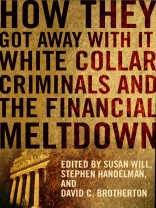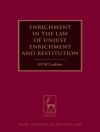A team of scholars with backgrounds in criminology, sociology, economics, business, government regulation, and law examine the historical, social, and cultural causes of the 2008 economic crisis. Essays probe the workings of the toxic subprime loan industry, the role of external auditors, the consequences of Wall Street deregulation, the manipulations of alpha hedge fund managers, and the ‘Ponzi-like’ culture of contemporary capitalism. They unravel modern finance’s complex schematics and highlight their susceptibility to corruption, fraud, and outright racketeering. They examine the involvement of enablers, including accountants, lawyers, credit rating agencies, and regulatory workers, who failed to protect the public interest and enforce existing checks and balances. While the United States was ‘ground zero’ of the meltdown, the financial crimes of other countries intensified the disaster. Internationally-focused essays consider bad practices in China and the European property markets and draw attention to the far-reaching consequences of transnational money laundering and tax evasion schemes. By approaching the 2008 crisis from the perspective of white collar criminology, contributors build a more general understanding of the collapse and crystallize the multiple human and institutional factors preventing capture of even the worst offenders.
Содержание
Acknowledgments Introduction Part I: Roots of the Crisis
1. Wall Street: Crime Never Sleeps
David O. Freidrichs
2. The Logics of Finance: Abuse of Power and Systemic Crisis
Saskia Sassen
3. America’s Ponzi Culture
Susan Will
4. Bernie Madoff
Jock Young Part II: Enablers of Fraud
5. Unaccountable External Auditors and Their Role in the Economic Meltdown
Gilbert Geis
6. And Some with a Fountain Pen: Mortgage Fraud Subprime Bubble
Harold C. Barnett
7. Generating the Alpha Return: How Ponzi Schemes Lure the Unwary in an Unregulated Market
David Shapiro Part III: Perverted Justice
8. The Technological Advantages of Stock Market Traders
Laureen Snider
9. Why CEOs Are Able to Loot with Impunity—and Why It Matters
William K. Black
10. The Façade of Enforcement: Goldman Sachs the Politics of Blame
Justin O’Brien Part IV: Perspectives from Afar
11. Reappraising Regulation: The Politics of ‘Regulatory Retreat’ in the United Kingdom
Steve Tombs and David Whyte
12. How They Still Try to Get Away with It: Crime in the Dutch Real Estate Sector Before and After the Crisis
Hans Nelen and Luuk Ritzen
13. Economic and Financial Criminality in Portugal
Rita Faria
14. Greece ‘For Sale’: Casino Economy and State-Corporate Crime
Sophia Vidali
15. Financial Fraud in China: A Structural Examination of Law and Law Enforcement
Hongming Cheng Epilogue Can They Still Get Away with It?
Appendix A Short (Global) History of Financial Meltdowns
Compiled by Alex Holden
Contributors
Index
Об авторе
Susan Will is an assistant professor of sociology at John Jay College of Criminal Justice.Stephen Handelman is director of the Center of Media, Crime, and Justice at John Jay College of Criminal Justice. He is the author of Comrade Criminal: Russia’s New Mafiya, which was named a New York Times Notable Book of the Year.David C. Brotherton is professor and chair of sociology at the John Jay College of Criminal Justice and the Graduate Center, the City University of New York. His most recent publication, with Luis Barrios, is Banished to the Homeland: Dominican Deportees and Their Stories of Exile.












